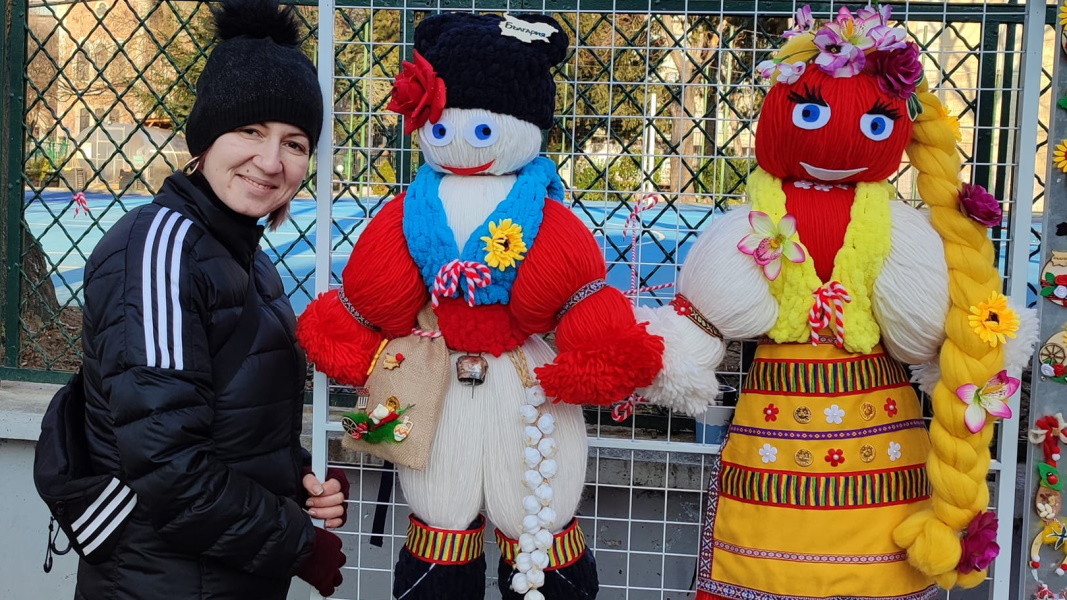The month of March is here and the promise of spring is in the air. On the first of March Bulgarians adorn themselves with martenitsa, this wonderful symbol of spring, the exchange of which is always accompanied by wishes for health, joy and prosperity throughout the year.
Since time immemorial Bulgarians have always believed in the triumph of light over darkness, the victory of good over evil, and it is this belief that is woven into the white and red amulets, called martenitsa.
They trust the magical power of martenitsa to protect and bring health. It must be worn until winter is gone, until one sees a tree in bloom or the first storks returning from Africa. The belief in the magical power of the martenitsa is so strong that even some Bulgarians carry it with them as a talisman throughout the year.
Weeks before March 1st talismans of white and red intertwined strands are literally everywhere. The central streets and squares of the capital have turned into an open exhibition of martenitsas - they delight the eyes and invite us to choose from them as gifts to friends, colleagues and loved ones.
And if you're wondering who makes the martenitsas - we'll introduce you to one of the skilled craftswomen right away. Kristina Merzakova is 33 years old, she graduated in economics and tourism in her hometown Varna, but a neurological disease forced her to stay at home. Seven years ago, she started making martenitsas on her own model.
Physicians told her that manual labour is beneficial for nervous diseases. So, along with raising her children, Christina took up martenitsa making. This year she made even more than ever, as she had to stay almost a whole month under quarantine. She says it was a good period for her, abundant in inspiration:

"For me and my family, that's how the quarantine affected us – all of us took up creative activities. My sons helped a little, but I got the most help from my husband. What I like most about martenitsa making is that you are free to create – you can invent new elements, add whatever you wish.
I like to add new elements so when people saw my martenitsas, they’d smile, they’d be captivated. This way the martenitsa celebration lasts longer. A lot of people choose martenitsas on a magnet, which are practically like a decoration for the home, not just for the first weeks of March. Others are looking for original design martenitsas to send to their Bulgarian friends and relatives abroad, for they are a powerful sentimental link to the homeland."
Christina Murzakova is one of the mothers in the group "Buy a gift from a mother of a child with disabilities". She says that this is where she gets the most support in raising her two children with special needs. The idea to make a huge martenitsa – good enough for Guinness Book of Records - was born in this group. So Christina from Varna made the traditional male and female martenitsa dolls Pijo and Penda, but at human height.
One can still see the gigantic white and red Pijo and Penda on the street next to the Sevastopol Garden in Varna where Christina will be selling today her martenitsas to help support the family:
First I did a normal size Pijo and Penda martenitsa. I liked it very much, and the other mothers in the group "Buy a gift from a mother of a child with disabilities" suggested that I should make another one – the same, only bigger. Then I decided that whatever it cost me, I would make it so children could come to my stall and have their picture taken with Pijo and Penda. I used a lot of yarn – 20 pounds. The figures have additional decorations, so they weigh over 22 pounds. I'm always trying to turn a flaw into an effect, and martenitsas help with that."
English version: Elizabeth Radkova
Photos: private libraryWho said Bulgarians were grumpy pessimists? Take a stroll through Sofia's Christmas bazaars and meet the cheerful crowd. The festive decorations, music, merry-go-rounds and stalls overflowing with treats and handmade souvenirs can make the gloomiest..
Bulgarian studies are highly valued at the Bogdan Khmelnitsky State Pedagogical University in the Ukrainian city of Melitopol. So it comes as no surprise that the university is hosting the latest edition of the International Bulgarian Studies Readings,..
"You say you are Bulgarian, but you do not know Bulgarian" – this reproach from officials in Bulgaria has been faced by quite a few by our compatriots from the historical Bulgarian communities around the world. One of them is Bledar Alterziu from..

+359 2 9336 661
